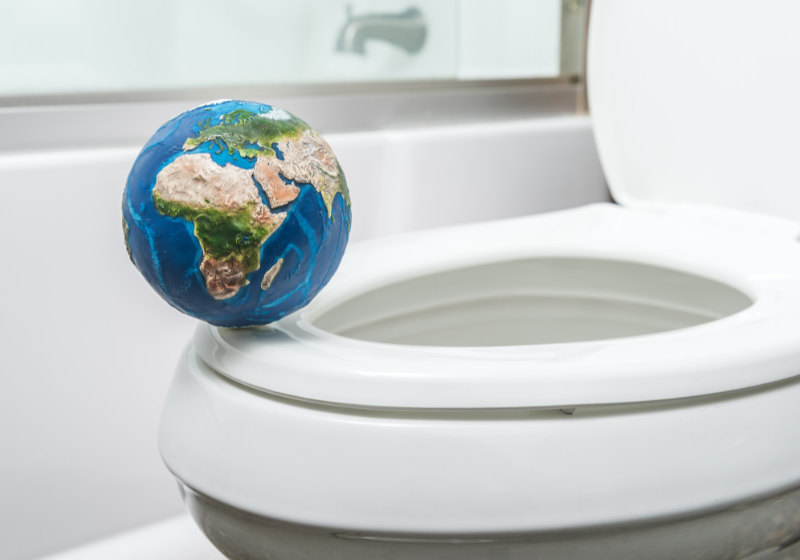On World Toilet Day we are reminded of the global urgency to ensure access to safe sanitation for all and the role that Water, Sanitation and Hygiene (WASH) plays in improving the quality of life for millions around the world. At Habitat Australia, we recognise the importance of aligning our programs with the Sustainable Development Goals including access to Water and Sanitation for all; ensuring that our efforts contribute to sustainable, long-term change in the Asia-Pacific region.
For families like Ruon and Chhoeuk in Cambodia, this mission is transforming lives in a profound way.
These are some of the Key messages for World Toilet Day, shared by the United Nations;
- Toilets are a place for peace. This essential space, at the centre of our lives, should be safe and secure. But for billions of people, sanitation is under threat from conflict, climate change, disasters and neglect.
- Toilets are a place for protection. By creating a barrier between us and our waste, sanitation services are essential for public and environmental health. But when toilet systems are inadequate, damaged or broken, pollution spreads and deadly diseases get unleashed.
- Toilets are a place for progress. Sanitation is a human right. It protects everyone’s dignity, and especially transforms the lives of women and girls. More investment and better governance of sanitation are critical for a fairer, more peaceful world.

Ruon and Chhoeuk’s Journey to a Safer, Healthier Home
Ruon and her husband Chhoeuk live in the Preah Vihear province of Cambodia, with their four children. Like many in rural communities, they rely on rice and cassava farming to provide for their family, with a monthly income of just 150USD combined, they earn just enough to cover essential needs such as food, healthcare, and their children’s education. However, the one thing they couldn’t afford was a toilet, despite knowing its importance to their health and saftey.

For Ruon and her daughters, the absence of a proper sanitation facility meant resorting to open defecation in nearby forests, even at night, risking exposure to snakes and other dangerous creatures. As Ruon explains, “When we want to defecate at night, we must run to the forest behind my house or dig a pit near my house because we cannot go far as it is dark, and we feared snakes and other venomous insects. During the daytime, I can ask to use the toilet of the neighbors sometimes”.
In late 2022, their lives took a positive turn when Habitat for Humanity, stepped in to support sanitation improvements in the region. Ruon’s family was selected as one of six households to receive subsidised materials to build a toilet. With the help of these materials and their own contributions, they constructed a safe, private facility for their family. Ruon’s husband, Chhoeuk, shared his relief, saying,
“I am very happy that I have a toilet to use, and my family members can access it easily. Now, we do not have more worries than in the past.”
The Role of Habitat for Humanity in WASH Programs
Habitat for Humanity Australia works across Asia and the Pacific, focusing on the improvement of WASH facilities in vulnerable communities. The importance of these initiatives cannot be overstated:
- Improved Health: Proper sanitation reduces the spread of diseases such as cholera, diarrhea, and dysentery, which are prevalent in areas with poor hygiene practices.
- Enhanced Safety: Women and girls, in particular, face safety risks when forced to practice open defecation, often in isolated or unsafe areas.
- Economic Impact: Having access to basic sanitation allows families to focus on income-generating activities rather than spending time searching for safe places to relieve themselves.
Habitat’s WASH Initiatives in Asia and the Pacific
Across the Asia-Pacific region, Habitat for Humanity’s WASH programs include the construction of toilets, water facilities, and the promotion of hygiene education. In countries like Cambodia, Vietnam, and Fiji, these efforts are helping communities become open defecation-free (ODF) by providing much-needed infrastructure and raising awareness of the importance of hygiene.
In Cambodia, where Ruon and Chhoeuk reside, the BRRC project is fully aligned with the local government’s goal to achieve ODF status by 2025. Working with local authorities, Habitat Cambodia identifies families like Ruon’s who are most in need and supports them with materials and knowledge to build toilets.
How You Can Help
Habitat for Humanity’s work is only possible through the generous support of donors and volunteers. This World Toilet Day, consider contributing to organisations like Habitat that are running programs to provide safe and sustainable sanitation for families like Ruon and Chhoeuk’s. Together, we can build a healthier, safer world, one toilet at a time.
By joining the global movement for improved sanitation, we help families reclaim their dignity and health, ensuring that no one is left behind in the journey toward a cleaner, safer future.
For more information on how to support Habitat for Humanity’s WASH initiatives, visit Habitat for Humanity Australia.
This project receives support from the Australian Government through the Australian NGO Cooperation Program (ANCP) and is in partnership with our implementing partner Habitat for Humanity Cambodia provide access to safe shelter.



